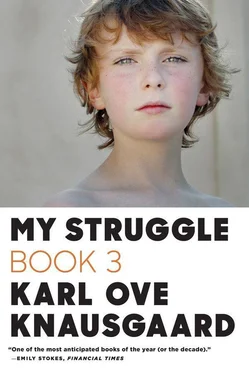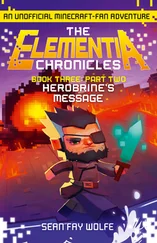Of course, I never heard the last of it. I was conceited, I thought I was quite something, I always had to like weird things, not what everyone else liked. That wasn’t true, though, in fact I liked good music and not bad music, surely that wasn’t my fault? — and I learned more and more about it, thanks to Yngve and his music magazines, which I plowed through, and to the records he played me. Bands like Magazine, The Cure, The Stranglers, Simple Minds, Elvis Costello, Skids, Stiff Little Fingers, XTC, the Norwegian groups Kjøtt, Blaupunkt, The Aller Værste! The Cut, Stavangerensemblet, DePress, Betong Hysteria, Hærværk. He also taught me more and more chords on the guitar, and when he wasn’t at home, I would play by myself with the black Gibson plectrum in my hand and the black Fender strap over my shoulder. To be on the safe side, I also bought a teach-yourself drums book, carved two sticks, placed some books around me in a circle on the floor, the one on the left was the hi-hat, the one next to it the snare drum, and the three books above them the tomtoms. The only person on my wavelength was Dag Magne, with whom I was spending more and more time. We were mostly up at his house, playing records and trying to copy the songs on his twelve-string guitar, but he also came down to ours, where we read magazines because Mom’s ban was no longer absolute, while listening to my cassettes and talking about girls or the band we were going to start, especially what we were going to call it. He wanted it to be Dag Magne’s Anonymous Disciples; I wanted it to be Blood Clot. Both were equally good, we agreed, and we didn’t need to make a decision until the time was ripe and we were performing on a stage.
In this way winter passed, with the first class parties, where we played spin the bottle and danced slow ones, round and round on the floor holding some of the girls we had been in the same class with for five years and knew better than our sisters, and my head almost exploded when I held Anne Lisbet’s body so close to mine. The fragrance of her hair, the sparkling eyes that were bursting with life. And, oh, the little breasts under the thin, white blouse.
Wasn’t that a fantastic feeling?
It was completely new, unknown for all these years, but now I knew it, now I wanted to go there again.
Winter passed, spring came, with its light, which every day held the passage to night open for a little longer, and with its cold rain, causing the snow to slump and dwindle. One of these March mornings, oppressed by the darkness and the rain, I went into the kitchen to have breakfast as usual. Mom had already left, she was on the early shift. She had forgotten to switch off the radio. Even in my room I had gathered that something had happened in the night because the voices on the radio — I could hear the resonance but not the words — sounded unusually dramatic. I buttered a piece of bread, added a slice of salami, and poured milk into a glass. There had been an accident in the North Sea, an oil platform had capsized. Raindrops slid slowly down the outside of the windows. The faint thrum of the rain on the roof surrounded the house like a membrane. The gutters were running. Up at Gustavsen’s a car was started, the headlights were switched on. It was a catastrophe, a number of people were missing, no one knew how many. When I arrived at B-Max half an hour later, my trousers tucked into my boots and my waterproof hood tied tightly around my face, no one spoke of anything else. Everyone knew someone who knew someone who had a father or a brother working on that particular platform. Alexander Kielland, it was called, and apparently one leg had given way. Was it a hundred-year wave that had caused it? A bomb? A construction fault?
In the first lesson the teacher talked about the accident, even though it was a math class. I wondered what Grandad would be saying now. He always told us we should find a job in oil. Oil was the future. But other signals were coming in from elsewhere: an item on the news had opened with a forecast that the oil reserves would soon be running out, it was happening faster than anyone would have believed, within a mere twenty-five years it would all be gone. I was fascinated by the year that was quoted, 2004, because it was so far into the future, and actually unreal, but treated here as a sober reality, different in kind from the one you met in science fiction books and magazines and hence shocking: would 2004 ever really arrive? In our lifetimes? At the same time I was also unnerved by the doom and gloom in these men’s voices warning of terrible things to come and despondent that something was going to come to an end. I didn’t like that; I wanted everything to last and go on forever. All ends were frightening. Therefore I hoped that Jimmy Carter would get a second term and that Odvar Nordli and the Socialist Party would win the next election. I liked Jimmy Carter. I liked Odvar Nordli even though he was always so drained and exhausted. I didn’t like Mogens Glistrup or Olof Palme, there was something smarmy about them, about their lips and eyes. Einar Førde and Reuilf Steen also had it, though not so much. But I liked Hanna Kvanmo. Not Golda Meir and not Menachem Begin, despite the Camp David Agreement. It was hard to judge Anwar Sadat. The same applied to Brezhnev, on quite a different scale, though. When I saw him standing there in his fur coat and hat, with the bushy eyebrows above the narrow Mongolian eyes in his expressionless face, mechanically waving to the parade below, as one artillery rocket after the other rolled past, surrounded by thousands of identical goose-stepping soldiers, I didn’t see him as human, he was something else, impossible to relate to.
Did I like Per Kleppe?
Yes, in a way, I certainly hoped with a passion that Kleppe’s anti-inflation packages would work.
I liked Hans Hammond Rossbach, but I considered Trygve Bratteli a bit odd with that low, whispering voice of his and his strange r ’s, the narrow shoulders and the big, skull-like head with the thick, black eyebrows.
The accident in the North Sea was the main topic of conversation for a quarter of an hour, then the lesson proceeded as usual, that is, we worked on sums in our books while the teacher walked between the rows of desks helping whoever needed it as the hand of darkness outside released its grip on the morning and it slowly became lighter. In the break someone said there might be air pockets inside the platform where you could survive for several days. Others said no parents from our school had been on board, but the father of a pupil at Roligheden was missing. It was hard to know where all the rumors were coming from, or how true they were. In the next lesson we had Norwegian. When Frøken sat down at her desk I put up my hand.
“Yes, Karl Ove?”
“Have you corrected our essays?”
“You’ll have to wait and see,” she said.
But she must have because the next thing she did was to go through some words and rules on the blackboard, which presumably were examples of the mistakes we had made in the essays we had handed in the Thursday before.
Yes indeed. The big pile of exercise books was taken from her bag and put on the desk.
“There were lots of excellent essays this time,” she said. “I could have read out all of them, but there wasn’t enough time, so I chose four. This doesn’t necessarily mean they are the best, as you know. Everyone in the class writes good essays.”
I stared at the pile to see if I could recognize mine. It wasn’t the one on top, that was for sure.
Anne Lisbet put up her hand.
She was wearing a white sweater. It suited her so well. Her black hair and black eyes went well with white, and her red lips and the redness in her cheeks, which always flushed when she came into the warm, did too.
Читать дальше












